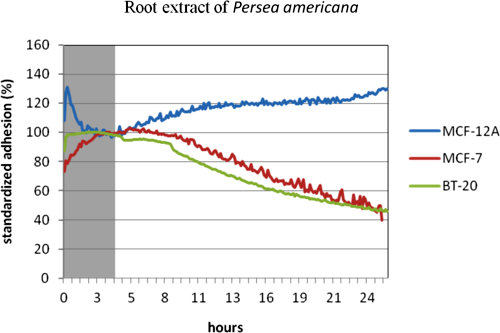 |
 |
||||||||||||||||||||||||
|
|
Here we demonstrate an online monitoring study of cell adhesion in two breast cancer cell lines (MCF-7, BT-20) in comparison with a non-tumorigenic epithelial mammary cell line (MCF-12A) under treatment with three plant extracts (avocado pear - Persea americana, sea buckthorn - Hippophae rhamnoides, european beech - Fagus sylvatica). Using the The Bionas® 2500 analyzing system and Bionas® metabolic chip SC1000 we showed that all three plant extracts reduce the adhesion capacity of the breast cancer cell lines MCF-7 and BT-20 in a concentration-dependent manner while the respiration and acidification rates were not influenced. Especially components of the root extract of Persea americana decreases the adhesion of MCF-7 and BT-20 about 50% after 20 hours treatment whereas the non-tumorigenic cell line MCF-12A showed slightly increased adhesion rates (Fig. 1). These findings let us draw the conclusion that Persea americana includes chemical compounds which decrease the adhesion of estrogen receptor positive as well as negative breast cancer cells lines while healthy tissue is not affected. This validates the extract as potential anticancer agent and even a prevention of metastasis is possible. However, further research is ongoing with the identification of anti tumor compounds in Persea americana by LC-MS and detailed mechanism of anticancer activities.
Fig. 1: Graph of the standarized adhesion rates (%) of the breast cancer cell lines MCF-7 and BT-20 in comparison with the non-tumorigenic epithelial cell line MCF-12A under treatment with a root extract of Persea americana (final concentration 0.1 µg/ml) using the The Bionas® 2500 analyzing system. Grey shadowed is the adaption time (approximately 4 hours) in pure running medium. Treatment with the plant extract was carried out for 20 hours at a flow rate of 56 µl/min with 4/4 min pump/stop phases. n=3. |
||||||||||||||||||||||||
|
|
|||||||||||||||||||||||||
| © 2011 Physics of Cancer | Soft Matter Physics Division, University of Leipzig. Imprint & Disclaimer | |||||||||||||||||||||||||
